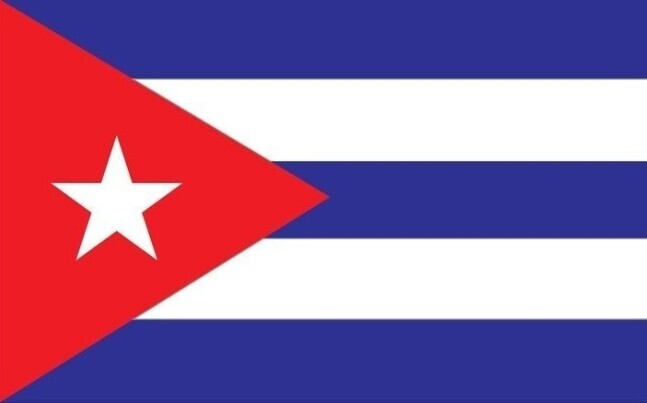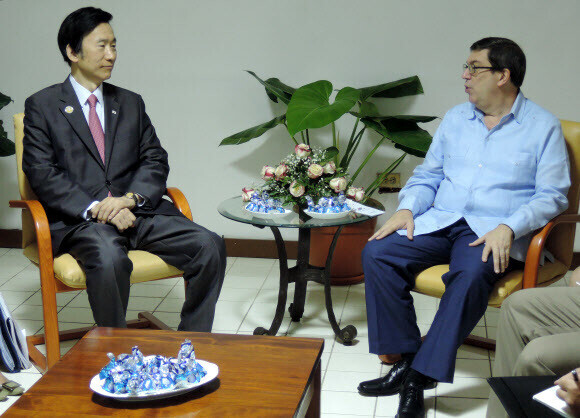hankyoreh
Links to other country sites 다른 나라 사이트 링크
[News analysis] How Cuba is expected to navigate its ties with North, South Korea

After South Korea unexpectedly established diplomatic relations with Cuba, extending its diplomatic sway in Central and South America, attention is focusing on the move’s potential ramifications. The South Korean government and presidential office described the establishment of diplomatic relations as the achievement of a longstanding goal of South Korean foreign policy and stressed the political blow it would inflict on North Korea. But most experts said that while establishing ties with Cuba is definitely a diplomatic feat, its practical impact on North Korea will be minor.
“Our country reached an agreement with Cuba to establish ambassador-level diplomatic relations between our two countries through the exchange of official diplomatic letters between our delegations to the UN in New York on Wednesday,” South Korea’s Ministry of Foreign Affairs said in a press release that evening.
Cuba, a communist state that is well-known for its fraternal relations with North Korea, was the only country in Central and South America with which South Korea did not have formal ties.
A high-ranking official at South Korea’s presidential office remarked on Thursday that establishing ties with Cuba had been a long-running challenge for Korean foreign policy.
“While Cuba is under US sanctions, it is a key country in Central and South America that maintains diplomatic relations with more than 190 countries. Furthermore, over a hundred countries have embassies in Havana. Cuba has played quite an important role in third-world diplomacy and continues to do so today,” the official said.
The government expects that formal diplomatic ties with Cuba will have a positive effect on increasing tourism, expanding exchange, strengthening economic cooperation and spreading Hallyu, also known as the Korean Wave.

Seoul also emphasized that the ties represent a diplomatic blow for North Korea, given the famously fraternal relations between the two communist states.
“In the end, establishing ties with Cuba clearly illustrates the course of history and the countries that are moving in the right direction. This will inevitably be a considerable political and psychological blow [for North Korea],” said a high-ranking official in Korea’s presidential office.
“This is the final stage in our foreign policy toward former members of the Socialist Bloc, including the countries of Eastern Europe, which were once friends of North Korea,” the official added.
Some even predicted that Cuba could join the international community in putting pressure on North Korea.
“This means that Cuba has become a partner we can talk with as part of the international community’s work on North Korea. Since Cuba is a member of the UN, we can now ask it to cooperate as needed or call for responsible behavior [from North Korea],” a senior member of the ruling People Power Party told the Hankyoreh on Thursday.
But experts predicted that establishing diplomatic ties between the two countries would not have a major impact on North Korea. The prevailing view is that Cuba will adopt a “two-track” strategy of expanding nonpolitical cooperation with South Korea while maintaining its traditional friendly relations with North Korea.
“Even after Russia established diplomatic relations with South Korea in 1990 and China did the same in 1992, they maintained different stances toward South and North Korea in regard to political issues and economic and cultural issues. Cuba will discreetly maintain its traditional friendly relations with North Korea while increasing exchange with South Korea for its economic advantage,” said Lim Eul-chul, who serves as the director of the North Korean Research Center at Kyungnam University’s Institute for Far Eastern Studies.
“This is doubtlessly a diplomatic triumph, but it’s uncertain what political or psychological blow there would be for North Korea since there’s no chance of Cuba cutting off diplomatic relations with the North,” said Park Byung-hwan, the director of the Eurasia Strategy Research Institute.
By Kim Mi-na, staff reporter; Kwon Hyuk-chul, staff reporter
Please direct questions or comments to [english@hani.co.kr]

Editorial・opinion
![[Editorial] Intensifying US-China rivalry means Seoul must address uncertainty with Beijing sooner than later [Editorial] Intensifying US-China rivalry means Seoul must address uncertainty with Beijing sooner than later](https://flexible.img.hani.co.kr/flexible/normal/500/300/imgdb/original/2024/0517/8117159322045222.jpg) [Editorial] Intensifying US-China rivalry means Seoul must address uncertainty with Beijing sooner than later
[Editorial] Intensifying US-China rivalry means Seoul must address uncertainty with Beijing sooner than later![[Column] When ‘fairness’ means hate and violence [Column] When ‘fairness’ means hate and violence](https://flexible.img.hani.co.kr/flexible/normal/500/300/imgdb/original/2024/0516/7417158465908824.jpg) [Column] When ‘fairness’ means hate and violence
[Column] When ‘fairness’ means hate and violence- [Editorial] Yoon must stop abusing authority to shield himself from investigation
- [Column] US troop withdrawal from Korea could be the Acheson Line all over
- [Column] How to win back readers who’ve turned to YouTube for news
- [Column] Welcome to the president’s pity party
- [Editorial] Korea must respond firmly to Japan’s attempt to usurp Line
- [Editorial] Transfers of prosecutors investigating Korea’s first lady send chilling message
- [Column] Will Seoul’s ties with Moscow really recover on their own?
- [Column] Samsung’s ‘lost decade’ and Lee Jae-yong’s mismatched chopsticks
Most viewed articles
- 1For new generation of Chinese artists, discontent is disobedience
- 2[Editorial] Transfers of prosecutors investigating Korea’s first lady send chilling message
- 3[Exclusive] Unearthed memo suggests Gwangju Uprising missing may have been cremated
- 4[Editorial] Intensifying US-China rivalry means Seoul must address uncertainty with Beijing sooner t
- 5S. Korea “monitoring developments” after report of secret Chinese police station in Seoul
- 6N. Korean media upgrades epithet for leader’s daughter from “beloved” to “respected”
- 7Yoon says concern about biased diplomacy is being incited by “communist totalitarian forces”
- 8[Column] US troop withdrawal from Korea could be the Acheson Line all over
- 9Xi, Putin ‘oppose acts of military intimidation’ against N. Korea by US in joint statement
- 1060% of young Koreans see no need to have kids after marriage